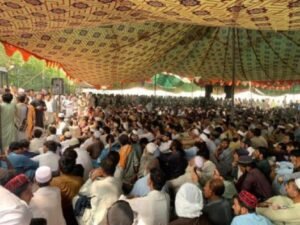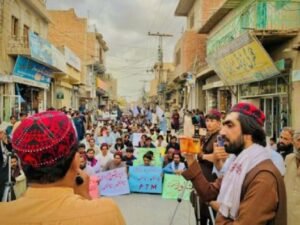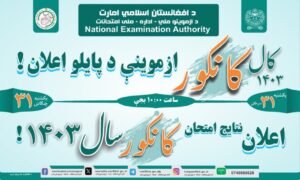UNSC’s Resolution 2721: Charting Afghanistan’s Path to Global Recognition and Reintegration

A UN vehicle in Kabul in November 2023. Photo: @AADIL
By A. Shafaq
In a significant move, the United Nations Security Council (UNSC) adopted Resolution 2721 during the last week of 2023, focusing on Afghanistan’s reintegration into the international community. This resolution, co-drafted by the United Arab Emirates (UAE) and Japan, garnered the support of 13 Security Council members, while Russia and China abstained from the vote. The resolution called for the appointment of a special envoy for Afghanistan to increase engagement with the country and its Taliban leaders.
The UNSC, through Resolution 2721, reaffirmed its unwavering commitment to Afghanistan’s sovereignty, independence, territorial integrity, and national unity. Additionally, the council expressed its continued support for the people of Afghanistan and called for concerted efforts to address a multitude of challenges faced by the nation.
Among the challenges highlighted in the resolution are humanitarian issues, human rights, especially those of women and girls, as well as concerns related to religious and ethnic minorities, security and terrorism, narcotics, development, economic and social challenges, dialogue, governance, and the rule of law.
A key component of the resolution is the request for the UN Secretary-General, Antonio Guterres, to appoint a Special Envoy for Afghanistan. This appointment is to be made in consultation with members of the Security Council, relevant Afghan political actors, stakeholders, including Afghan women and civil society, as well as the broader international community and the region.
The UAE Mission to the UN emphasized that the resolution encourages member states and relevant stakeholders to consider increasing international engagement in a more coordinated and structured manner. The overarching objective is to achieve a peaceful, stable, prosperous, and inclusive Afghanistan that is fully reintegrated into the international community.
During the meeting, representatives from China and Russia stressed the importance of effective communication and engagement with Afghan authorities to provide constructive support. The Russian envoy welcomed the resolution’s addressing of critical issues such as countering terrorist and drug threats, humanitarian assistance, human rights, and the development of a substantive roadmap for Afghanistan.
However, the Spokesperson of the Foreign Ministry of Afghan Government expressed displeasure with the UNSC’s resolution. Despite disagreements among member states, the resolution was approved, prompting the Taliban to issue a statement asserting the unnecessary nature of appointing a UN special representative while the UN Assistance Mission in Afghanistan (UNAMA) is active. The statement also criticized historical failures of special envoys and urged the UN to consider Afghanistan’s religious, cultural, and national beliefs and interests in any decision. However, the Taliban was positive on the focus of the resolution to increase engagement with the Afghan government.
In a separate resolution related to Afghanistan’s humanitarian situation, the UNSC highlighted the critical importance of maintaining the presence of the United Nations Assistance Mission in Afghanistan (UNAMA) and other UN agencies, funds, and programs across the country. This underscores the council’s full support for the mandate and work of UNAMA and the Special Representative of the Secretary-General.
The humanitarian situation in Afghanistan has deteriorated since international aid was suspended following the Taliban’s resurgence in August 2021. The resolution, jointly crafted by Japan and the UAE, aims to address these challenges comprehensively and facilitate the country’s reintegration into the global community while emphasizing the importance of humanitarian assistance and women’s rights in Afghanistan. It remains to be seen how this resolution will impact the ongoing efforts to bring the Taliban and the international community together for discussions and potential breakthroughs.
A. Shafaq (pseudonym) is a researcher and lecturer at one of the private universities in Kabul.
Note: The contents of the article are of sole responsibility of the author. Afghan Diaspora Network will not be responsible for any inaccurate or incorrect statement in the articles.





